The 17 Best AI Sales Assistants for Sales Teams in 2025
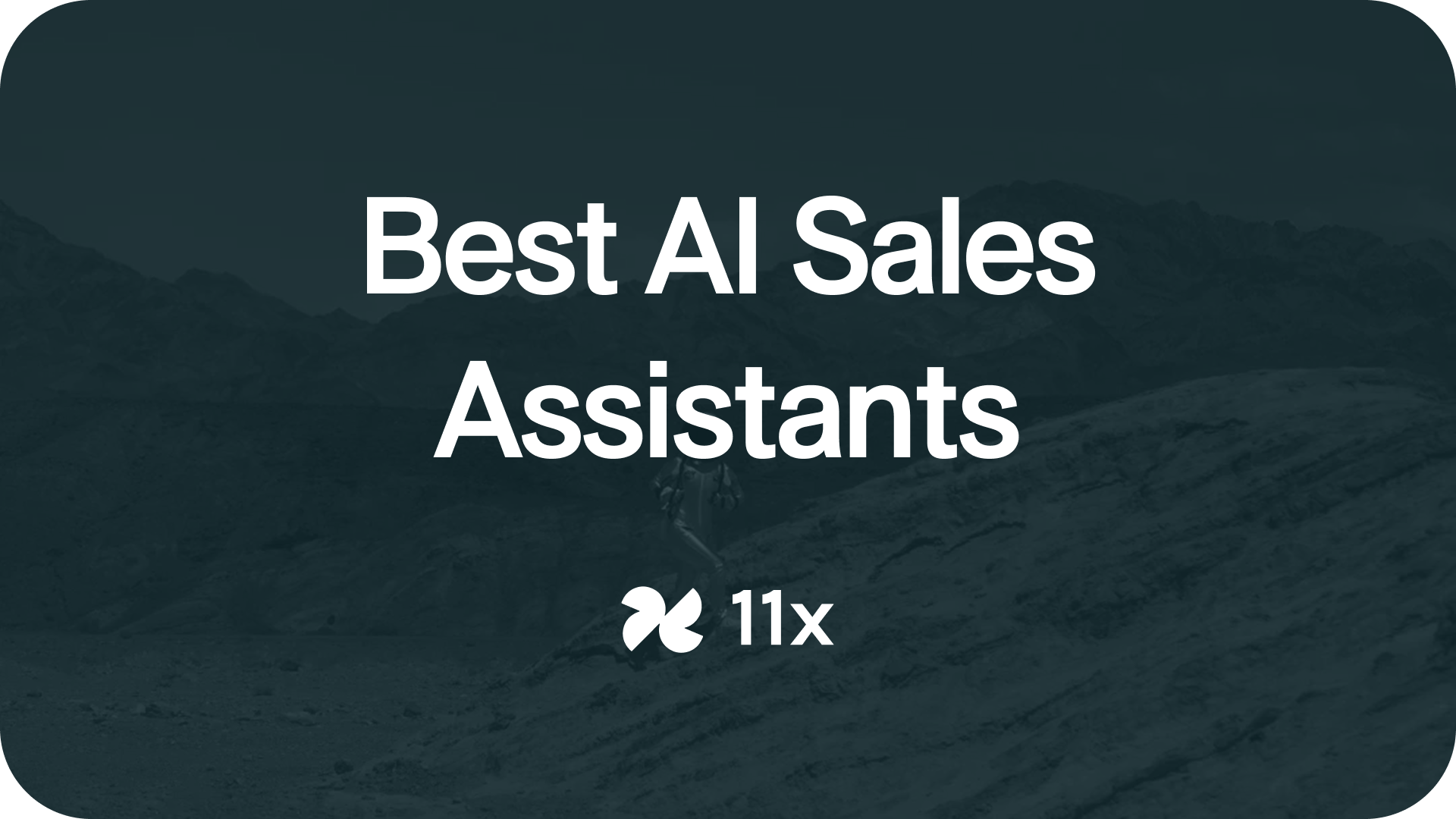
Sales teams face constant strain. Reps miss follow-ups because their workflows are spread across too many tools. Managers lose visibility into the sales pipeline as manual data entry and CRM upkeep consume hours every week. Even top teams struggle with fatigue and inefficiency. The problem is not effort. It is capacity.
AI sales assistants solve that. They are not just automation tools but intelligent virtual assistants powered by artificial intelligence, machine learning, predictive analytics, and natural language processing. By using AI to handle time-consuming work such as data entry, scheduling, enrichment, and reporting, they let salespeople focus on what drives growth—closing deals and building relationships.
This article explores how AI sales assistants are reshaping the sales process in 2025. It explains why adoption is growing, how 11x set a new benchmark for performance, and profiles 17 leading platforms across prospecting, forecasting, coaching, and real-time conversation intelligence.
Why AI Sales Assistants Are Critical in 2025
- Faster lead qualification: AI assistants score and prioritize high-value potential customers automatically.
- Streamlined workflows: They eliminate manual data entry, generate summaries, and sync with CRM systems.
- Consistent follow-ups: Automated outreach ensures no lead is forgotten.
- Sales coaching: Copilot-style prompts and playbooks improve rep performance in real time.
- Conversion optimization: Insights from sales calls and customer interactions translate into better strategies.
Categories of AI Sales Assistants
AI sales assistants now specialize across every stage of the sales journey, spanning from lead generation to forecasting. To make it easier to compare capabilities, we’ve grouped them into four main categories based on where they deliver the most impact.
The table below outlines these categories at a glance, showing how each type supports specific sales workflows and which tools lead the field in 2025.
Outbound Automation
- 11x Alice
- Core strength: Full-cycle outbound automation
- Features: Prospecting, CRM enrichment, personalized outreach (email & LinkedIn), NLP tone adaptation, lead revival, multilingual support, Slack alerts
- Integrations: CRMs, Slack
- Best for: Teams scaling global outbound with personalization
- Artisan Ava
- Core strength: End-to-end outbound campaign automation
- Features: Lead list building, enrichment, personalized cold emails, automated follow-ups
- Integrations: Salesforce, HubSpot, Slack
- Best for: SMBs or startups needing scalable outreach
- Instantly
- Core strength: Centralized email outreach & analytics
- Features: Follow-ups, open/reply tracking, campaign dashboards, deliverability tools
- Integrations: Gmail, Outlook, CRMs
- Best for: High-volume cold email campaigns
- Regie.ai
- Core strength: AI content generation for outbound
- Features: Creates email sequences, LinkedIn posts, playbooks; adapts tone per prospect
- Integrations: Salesforce, HubSpot
- Best for: Teams seeking brand-consistent AI-written content
- Clay
- Core strength: Data enrichment & dynamic profiling
- Features: 50+ data source connections, rich prospect profiles (competitors, pricing, firmographics), real-time CRM sync
- Integrations: Salesforce, HubSpot
- Best for: Data-driven teams improving lead quality
- CoPilot AI
- Core strength: LinkedIn prospecting automation
- Features: Lead scoring, personalized connection messages, profile analysis
- Integrations: LinkedIn, CRMs
- Best for: LinkedIn-heavy B2B prospecting teams
Inbound Qualification
- 11x Julian
- Core strength: Always-on inbound qualification
- Features: Instant responses, qualification criteria, lead routing, summaries, sentiment analysis
- Integrations: CRMs, Slack
- Best for: Teams needing 24/7 inbound response
- My AI Front Desk
- Core strength: Virtual receptionist for SMBs
- Features: Handles inbound calls, qualifies leads, schedules meetings, routes calls
- Integrations: Calendly, phone systems
- Best for: Small businesses automating inbound calls
- Dialpad AI Sales
- Core strength: Real-time sales conversation coaching
- Features: Live prompts, summaries, buyer intent detection, performance analytics
- Integrations: Salesforce, HubSpot, Slack
- Best for: Sales orgs optimizing rep performance
- CoPilot AI
- Core strength: LinkedIn inbound engagement
- Features: Auto-responds to new connections, inbound DM analysis
- Integrations: LinkedIn, CRMs
- Best for: Social selling and inbound on LinkedIn
Sales Coaching
- Gong
- Core strength: Conversation intelligence leader
- Features: Call recording & analysis, action item highlights, predictive analytics, deal scoring
- Integrations: Salesforce, HubSpot, Slack
- Best for: Enterprise sales teams improving conversion
- Chorus.ai (ZoomInfo)
- Core strength: Conversation capture & analytics
- Features: Summaries, dashboards, playbook generation from real calls
- Integrations: Salesforce, ZoomInfo
- Best for: Mid-to-large teams tracking rep calls
- Otter.ai
- Core strength: Real-time transcription & note automation
- Features: Transcribes calls, generates summaries/action items, CRM sync
- Integrations: Salesforce, HubSpot, Google Meet
- Best for: Individual reps or small teams
- Avoma
- Core strength: Meeting intelligence & coaching
- Features: Transcription, insights, dashboards, coaching tools
- Integrations: CRMs, Zoom, Google Meet
- Best for: Sales managers tracking rep performance
- Fathom
- Core strength: Lightweight meeting assistant
- Features: Key highlights, summaries, shareable notes
- Integrations: Zoom, CRMs
- Best for: Reps wanting quick, non-intrusive call insights
Revenue Intelligence
- Clari
- Core strength: Predictive forecasting leader
- Features: Pipeline risk detection, real-time insights, revenue analytics
- Integrations: Salesforce, HubSpot
- Best for: Large sales orgs and RevOps teams
- Forwrd
- Core strength: Predictive revenue intelligence
- Features: Lead scoring, pipeline forecasting, risk flagging, prioritization
- Integrations: CRMs, BI tools
- Best for: Growth teams optimizing deal prioritization
- Apollo.io
- Core strength: Hybrid intelligence + outreach
- Features: Lead enrichment, email automation, deal tracking, forecasting modules
- Integrations: Salesforce, HubSpot, Gmail
- Best for: Teams wanting one platform for outreach + insights
Outbound Prospecting & Email Outreach Assistants
1. 11x Alice
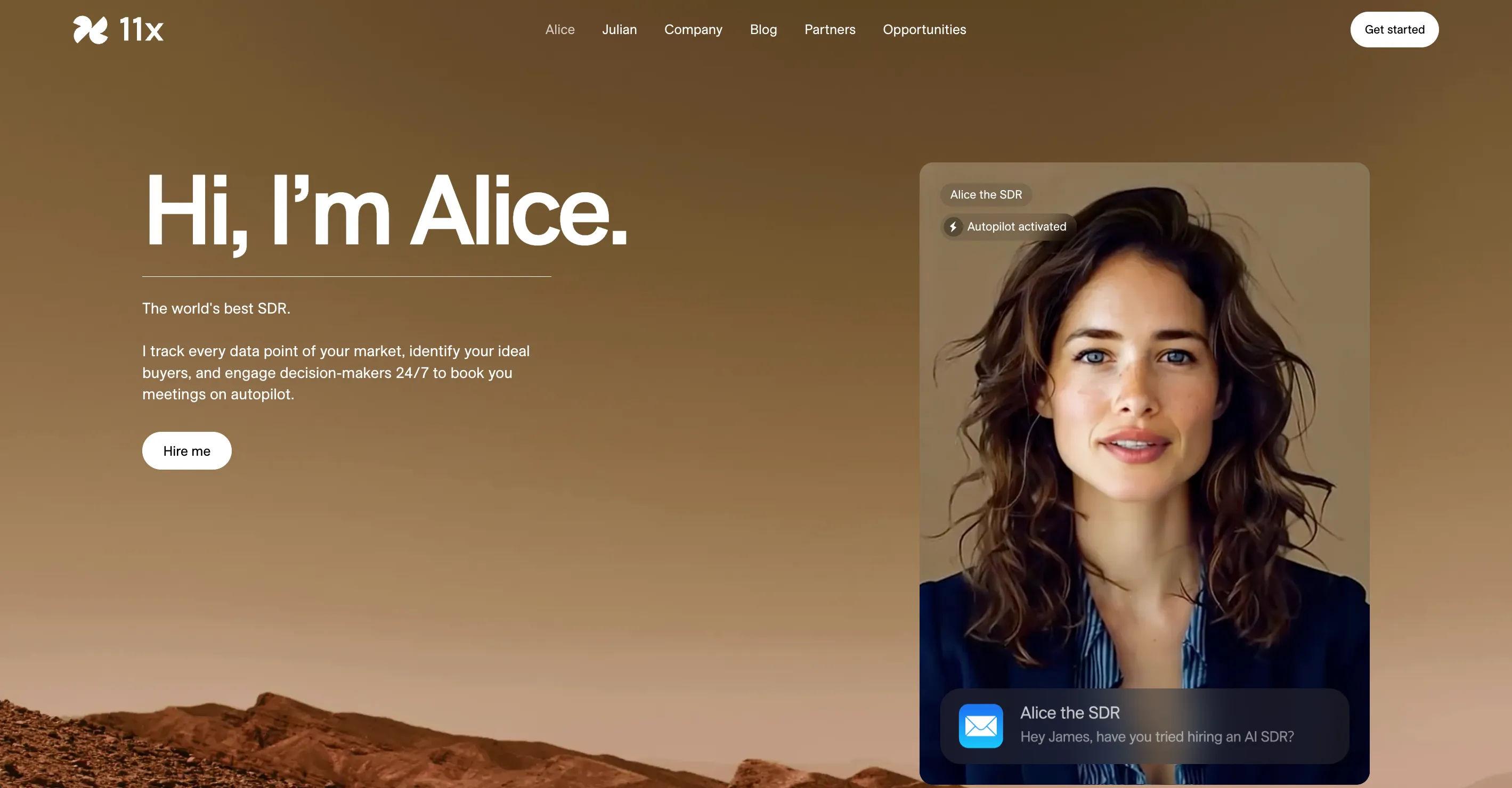
Alice from 11x is the gold standard for outbound automation, operating as a fully autonomous SDR that runs your outreach 24/7. She identifies high-intent prospects from its comprehensive database of 400M+ B2B contacts, enriches contact data with deep firmographic and technographic data, and creates personalized engagement across email and LinkedIn. Every message adapts dynamically to the recipient’s tone, role, and past interactions to preserve a genuine, human feel.
Alice provides:
- Richer prospect intelligence: integrates more than 20 premium data providers, real-time intent signals, and live search to surface the right prospects at the right moment.
- Personalization that scales: uses research agents and layered personalization frameworks to adapt messaging by role, product, and market context.
- Reliable omni-channel outreach: incorporates inbox rotation, email warming, and spam protection to maintain consistent deliverability across email, LinkedIn, and other channels.
- Enterprise-ready by design: adheres to SOC 2, GDPR, and CASA Tier 3 standards, with dedicated CSMs, Slack support, and direct CRM integrations (e.g, Salesforce, Hubspot)
By replacing multiple point tools for enrichment, outreach, and domain warmup, Alice simplifies your stack and cuts the costs you’d otherwise spend on maintaining separate tools.
Book a live product demo to see how Alice can build a qualified pipeline on automapilot, so your team can focus on closing deals.
2. Artisan Ava
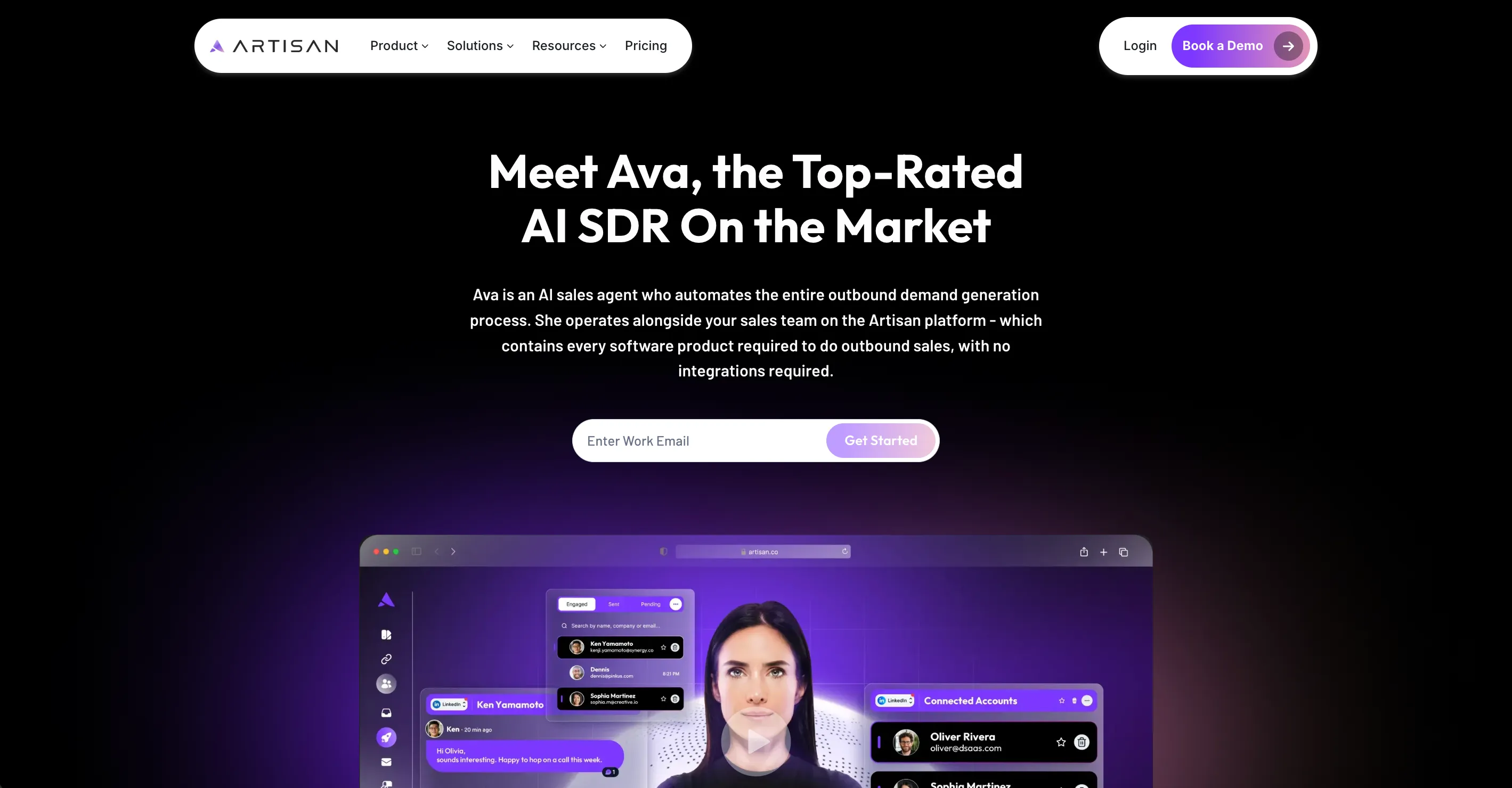
Ava from Artisan automates outbound sales from list building to follow-up. She compiles and enriches precise lead lists, personalizes cold emails using contextual data, and manages entire nurture sequences without manual input. Ava uses conversational AI to adjust tone and delivery based on audience behavior, while keeping every message aligned with brand voice. Her adaptive scheduling ensures outreach lands at the optimal time across global markets. By integrating directly with Salesforce, HubSpot, and Slack, Ava keeps all prospect data synchronized and accessible.
For SDR managers, it also provides reporting dashboards to uncover which sequences perform best, helping refine strategies.
3. Instantly
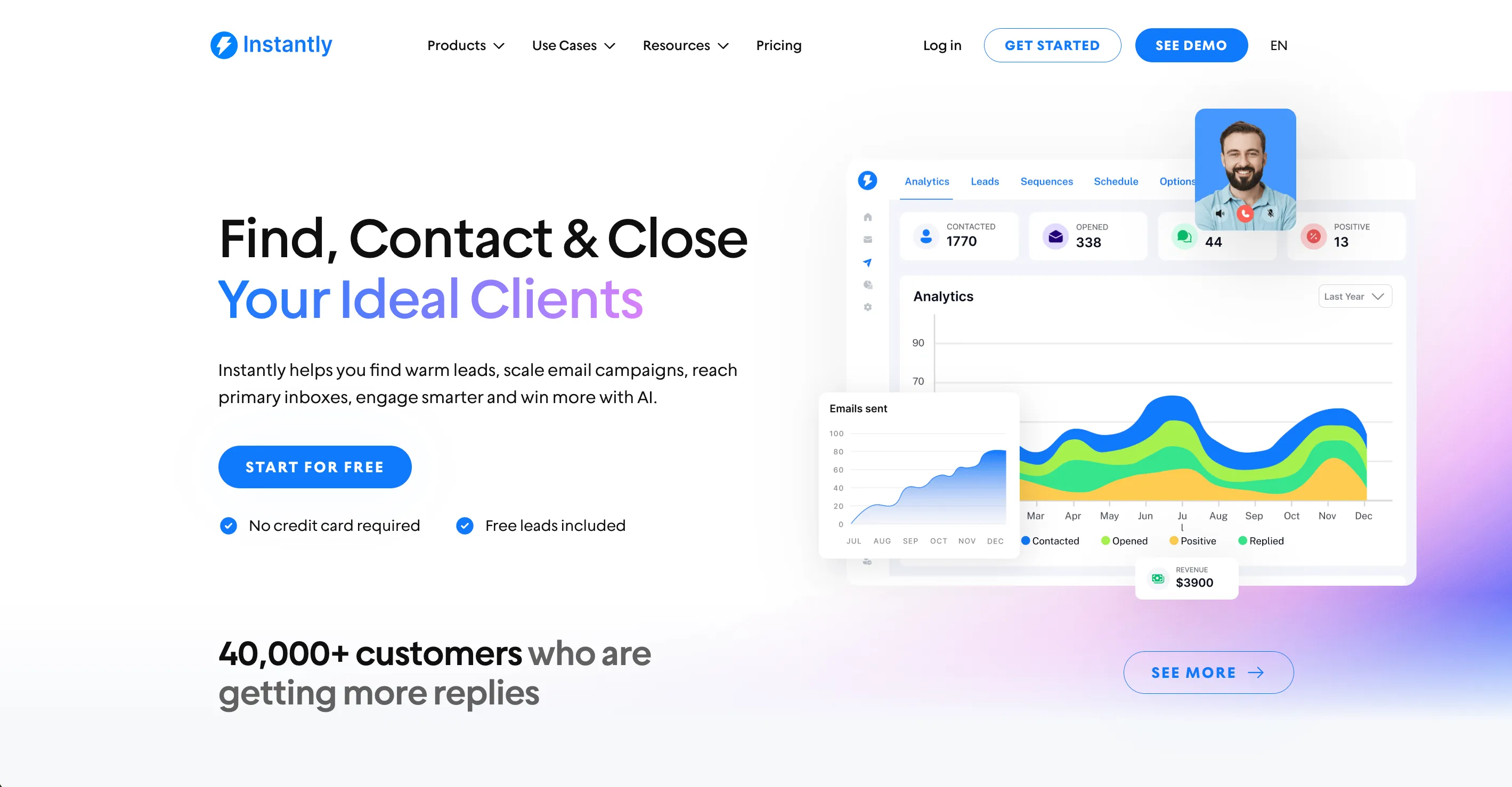
Instantly centralizes everything email-related and gives teams a single command center to manage outreach at scale. It automates follow-ups, tracks engagement metrics, and optimizes send timing based on real performance data. Instantly’s AI-powered personalization crafts messages that adjust subject lines and copy tone for better deliverability and authenticity.
For managers, the platform’s detailed dashboards surface insights into open rates, click-throughs, and response quality, making it simple to fine-tune campaigns. It also syncs activity logs directly with CRM records, eliminating the usual fragmentation between systems. By replacing spreadsheets and manual monitoring, Instantly lets small and mid-size teams run outreach programs that feel highly coordinated and effortless to maintain.
4. Regie.ai
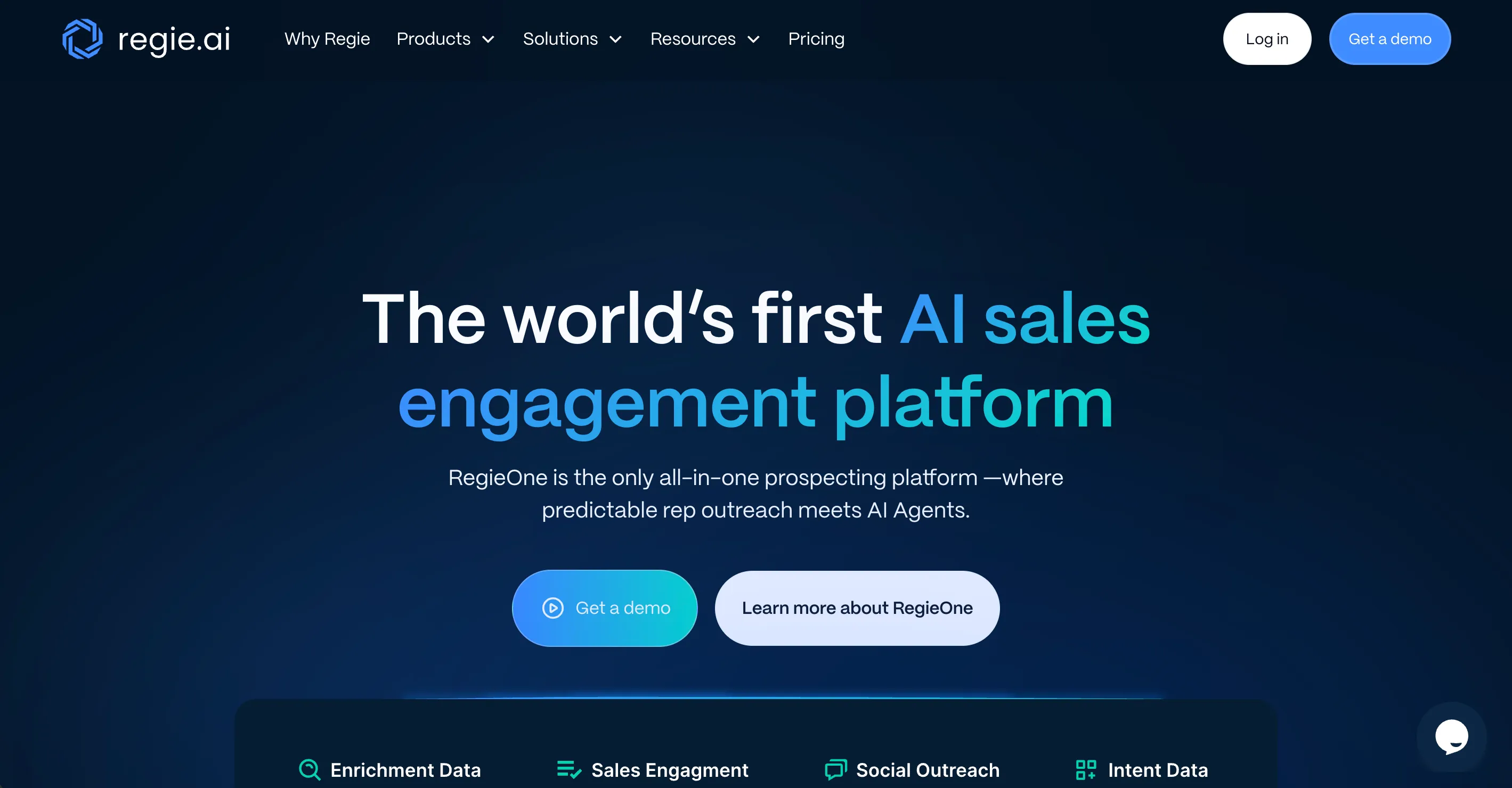
Regie.ai uses generative AI to maintain brand consistency across every channel while scaling creative content production. Sales teams can use it to build complete outreach flows, from personalized email templates to LinkedIn posts and in-platform playbooks that adapt as market conditions shift.
Regie.ai’s AI-generated sequences evolve with engagement data, learning which formats perform best over time. It links with Salesforce and HubSpot to ensure every message reflects accurate contact data, reducing redundancy and improving personalization quality.
Regie.ai works especially well for revenue organizations looking to unify marketing and sales messaging in one continuous workflow. Teams save hours of manual content creation while gaining consistency, scalability, and smarter messaging iterations driven by analytics.
5. Clay

Clay serves as a powerful enrichment engine that continuously refines lead data to keep it current and usable. By connecting to more than 70 data sources, Clay fills gaps in information such as company size, location, competitors, and recent funding events. It integrates directly with leading CRMs to update profiles automatically, reducing the need for manual research or data upkeep.
Clay’s AI-powered enrichment categorizes and scores leads based on relevance and revenue potential, allowing reps to prioritize outreach strategically. This capability transforms raw contact lists into dynamic, high-value prospect databases.
For teams that depend on accurate data as the backbone of their campaigns, Clay ensures no opportunity is lost because of incomplete or outdated details.
Inbound Qualification & AI Call Assistants
6. 11x Julian
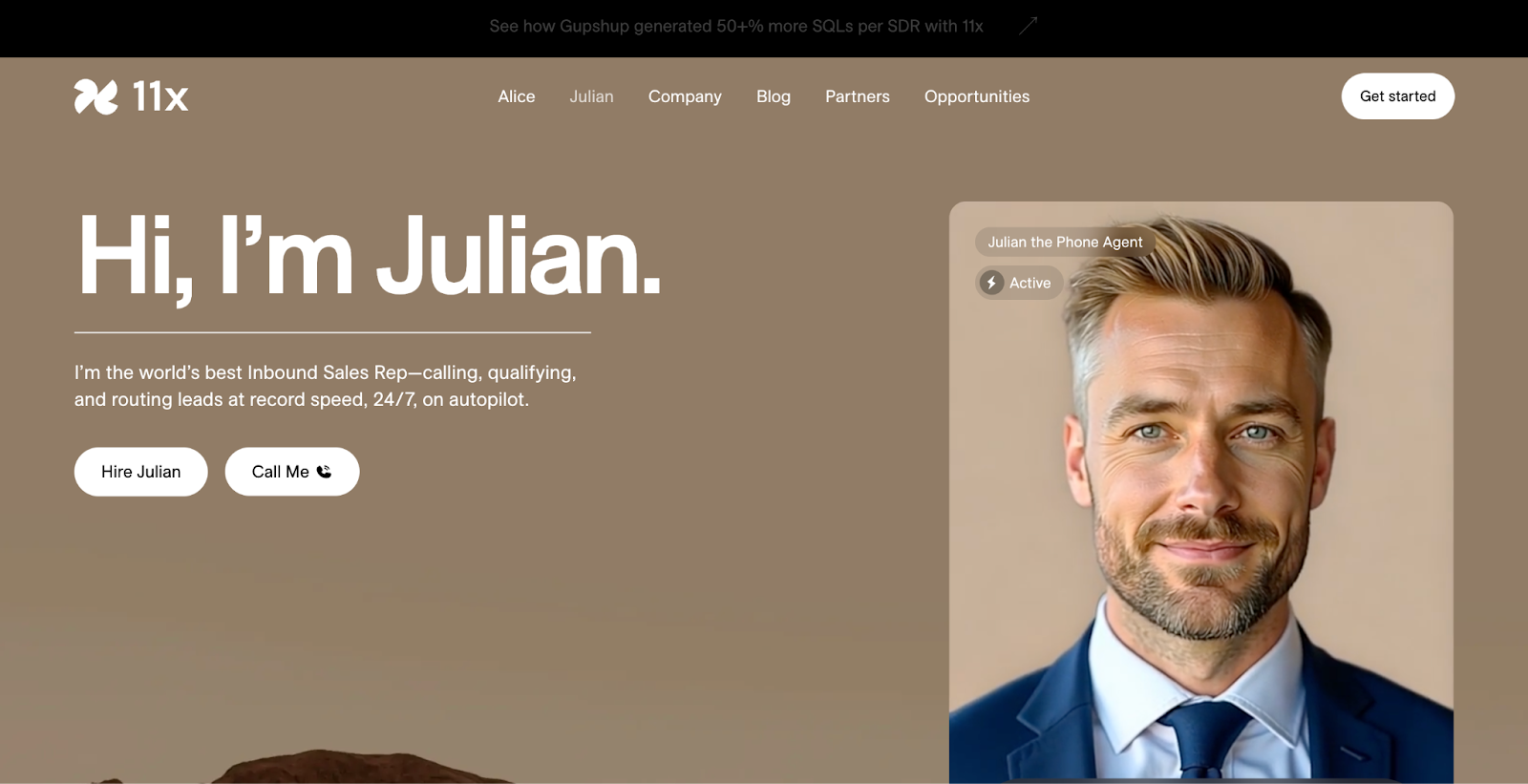
Julian from 11x is an AI phone agent purpose-built to accelerate inbound lead handling and qualification. He responds to new leads within seconds, engages each caller using your approved playbooks, and qualifies prospects against your custom-defined criteria before routing them to the right sales rep.
Beyond speed, Julian adds depth: he records and summarizes every call, applies real-time sentiment analysis, and syncs structured outcomes directly into your CRM. He also follows up automatically, reducing no-shows and reactivating old prospects stored in your database.
For growth teams managing large inbound volumes, Julian ensures consistency that manual reps cannot match. Integrated with Salesforce, HubSpot, and Slack, he transforms every missed call into a potential meeting.
Book a live demo to see how Julian can handle lead qualification on autopilot.
7. My AI Front Desk
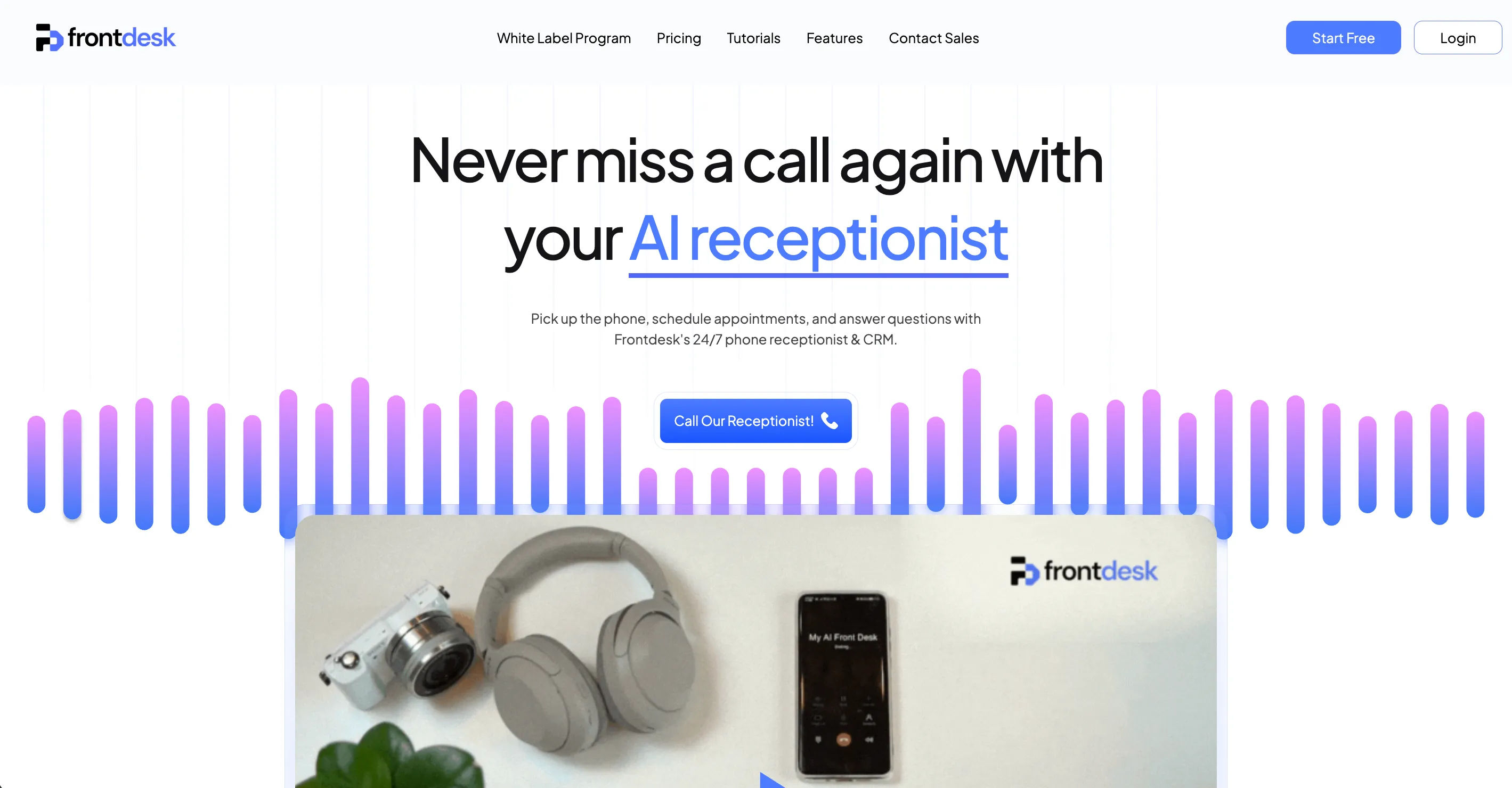
My AI Front Desk acts as a digital receptionist designed for small and mid-sized businesses that field high call volumes. The assistant greets callers, qualifies their needs, and schedules appointments without requiring staff involvement. It integrates with major scheduling applications and CRMs to capture and route every inquiry correctly.
For teams struggling to manage unpredictable inbound flow, this solution prevents lost leads during off-hours or peak activity. My AI Front Desk is particularly effective for service-based companies that depend on phone interaction but lack a full-time operator.
With natural language understanding that feels human, My AI Front Desk provides consistent, professional, and responsive front-line engagement.
8. Dialpad AI Sales
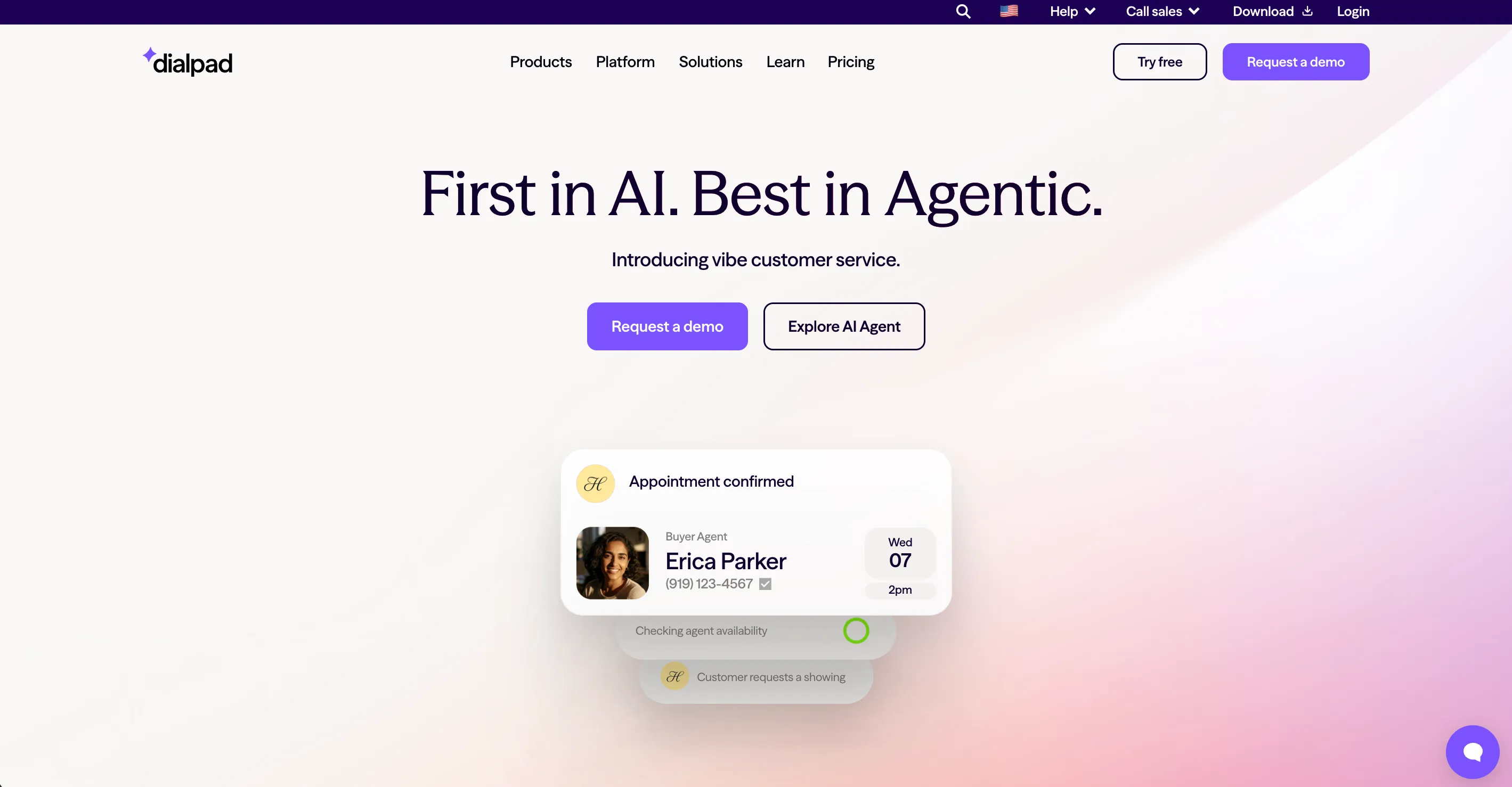
Dialpad’s AI Sales platform brings conversation intelligence into real-time selling. During calls, it analyzes tone, keywords, and sentiment to surface instant coaching prompts or competitor mentions directly on-screen. After the conversation, Dialpad generates searchable summaries, highlights key objections, and logs updates to connected CRM systems. The AI-powered assistive layer improves rep win rates by helping them react intelligently while calls are still live.
For managers, Dialpad provides aggregate analytics that track performance trends and identify training gaps. It is ideal for organizations focused on sharpening call execution and documentation accuracy without manual note-taking.
9. CoPilot AI
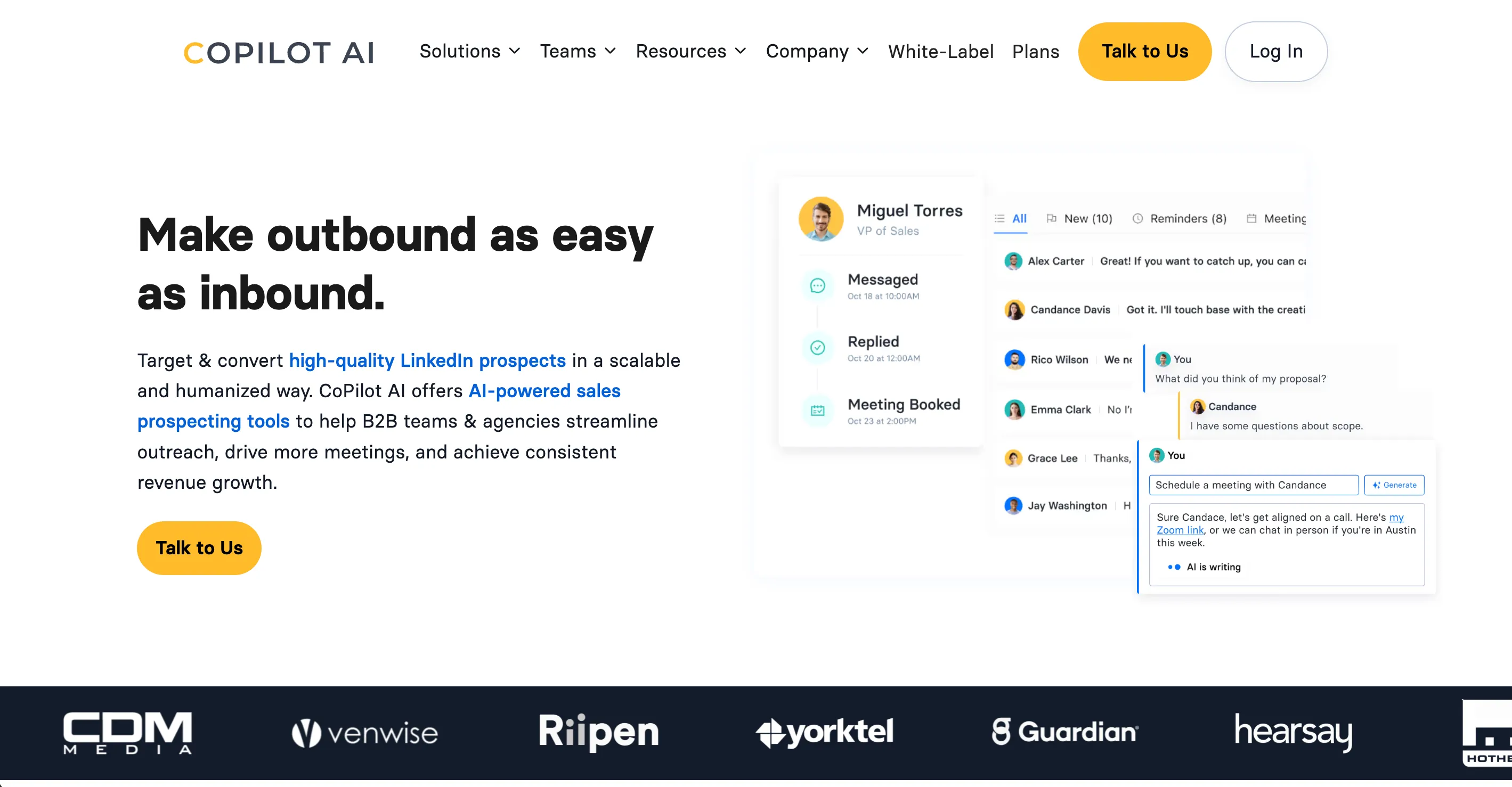
By using AI-generated insights from profile data and behavior signals, CoPilot AI builds sequences that feel tailored yet scalable. Activity is logged automatically to CRM systems for full visibility of campaigns. For teams that rely heavily on LinkedIn as a channel, CoPilot eliminates repetitive connection and messaging work, yet maintains personal resonance in each interaction. This results in a more efficient top-of-funnel motion with higher acceptance and response rates.
Sales Coaching & Conversation Intelligence Assistants
10. Gong
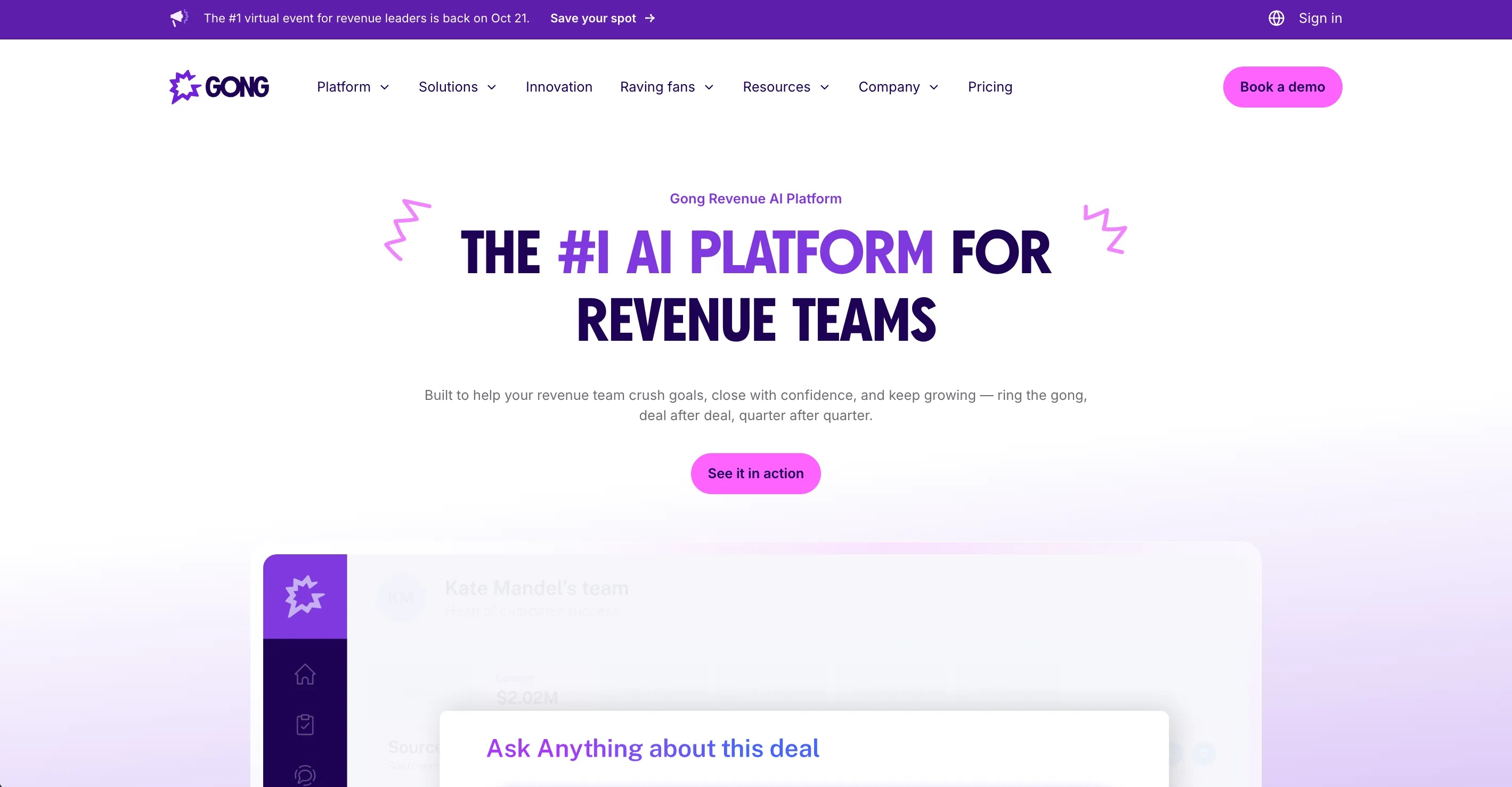
Gong captures and analyzes every customer interaction to deliver rich conversation intelligence. Its AI-powered engine records calls, highlights pivotal moments, and produces summaries with actionable insights. Sales leaders can identify which topics correlate with successful closes and coach reps based on actual data rather than intuition. Gong also integrates forecasting signals directly into CRM workflows, creating a clear link between conversational behavior and deal outcomes.
Beyond analysis, Gong visualizes pipeline risks, competitor mentions, and sentiment trends across all reps. This combination of call recording, predictive analytics, and enablement features turns daily conversations into a continuous feedback loop that improves selling precision.
11. Chorus.ai by ZoomInfo
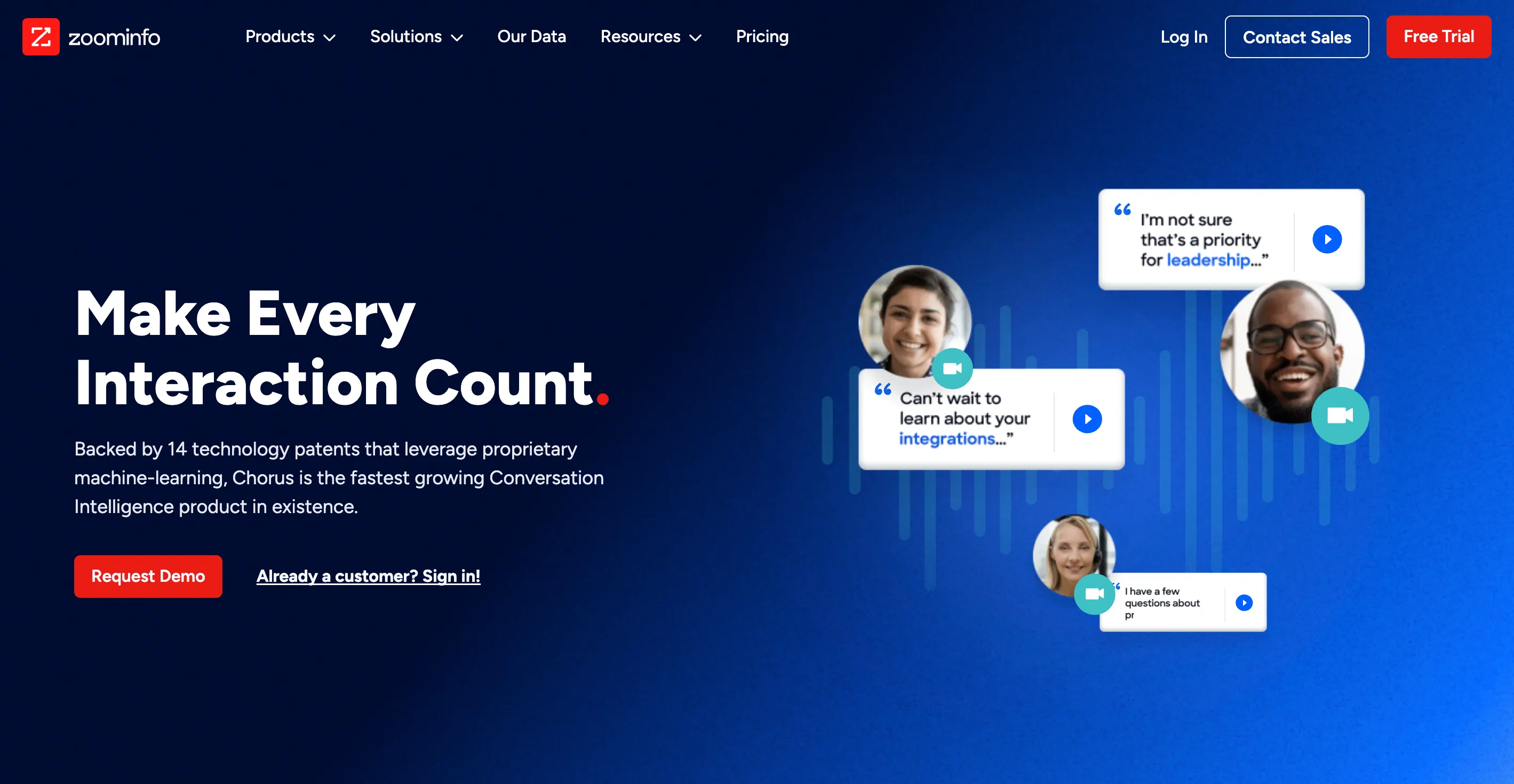
Chorus.ai automatically captures, transcribes, and analyzes sales conversations, transforming them into searchable, shareable intelligence assets. The platform creates detailed playbooks from real data, helping teams replicate top-performer strategies. Sales managers use Chorus’s dashboards to view talk ratios, objection patterns, and engagement sentiment across calls. Integrated directly with ZoomInfo’s data cloud, it enhances lead context and reduces manual follow-up tracking.
Chorus’s AI-generated summaries simplify note-taking and ensure CRM accuracy, giving both managers and reps immediate access to the most relevant insights. For organizations looking for a training and performance improvement system grounded in conversation data, Chorus is a platform worth considering.
12. Otter.ai
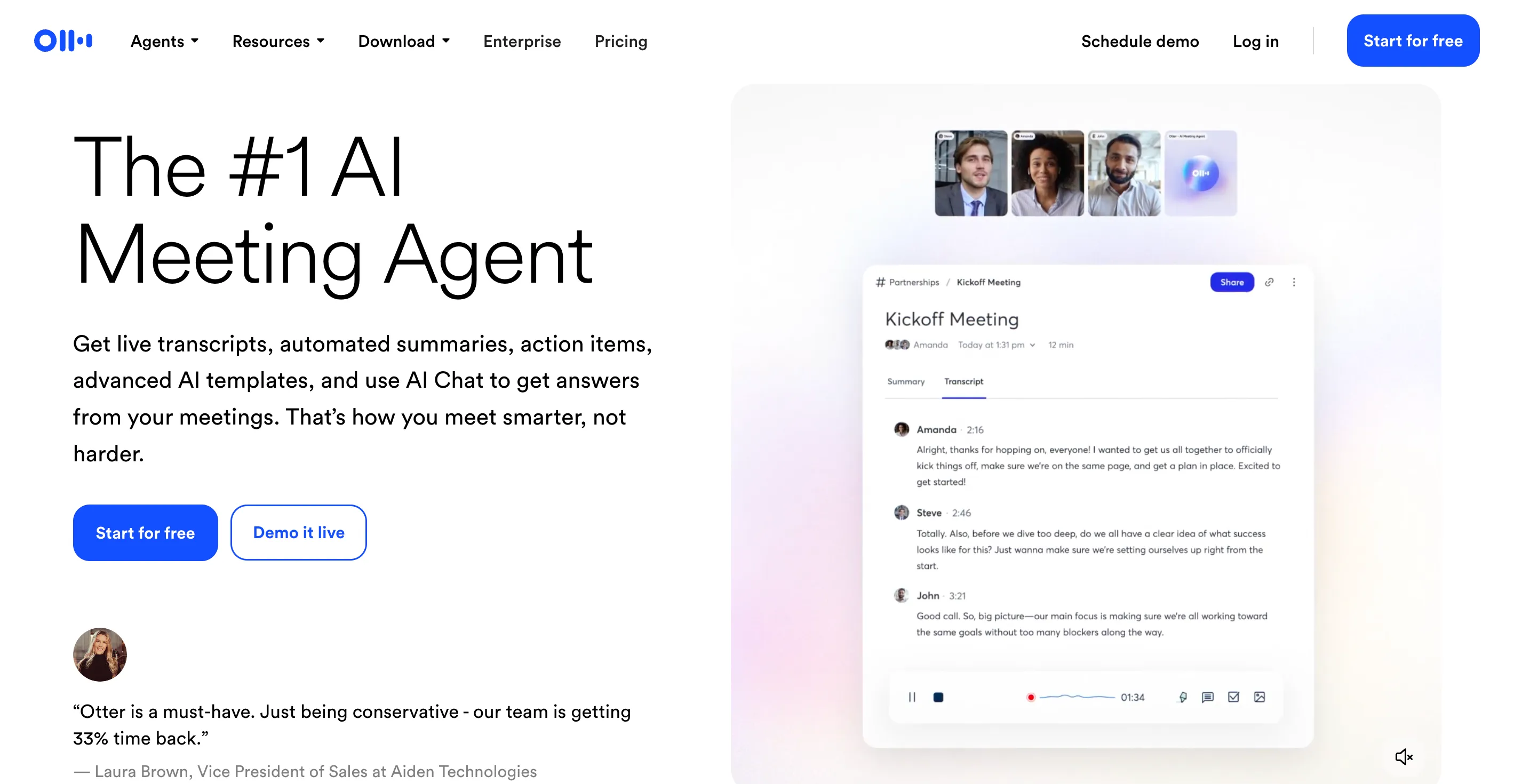
Otter.ai brings automation to meeting documentation. It transcribes calls in real time, identifies key decisions, and creates follow-up action items without any manual input. Its OtterPilot assistant uses AI-powered summarization to detect themes and next steps, syncing directly into Salesforce or HubSpot. Otter’s call recording capability ensures no detail is lost, providing full transparency for coaching and re-engagement.
Teams save hours weekly that would otherwise be spent writing notes. For revenue leaders managing remote or hybrid teams, Otter ensures alignment across every stage of the sales cycle while delivering consistent, high-quality documentation.
13. Avoma
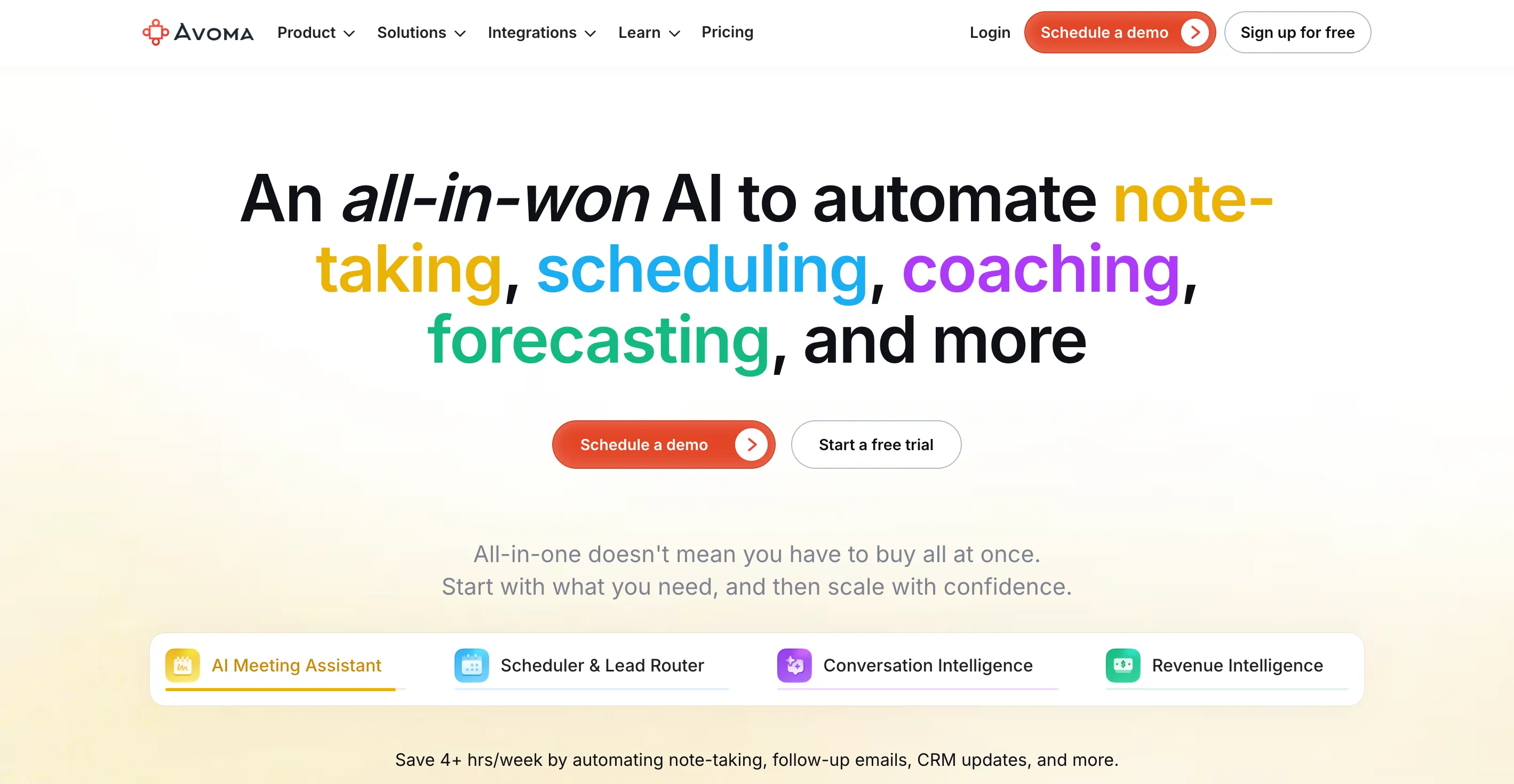
Avoma combines conversation capture, transcription, and meeting analysis to enhance rep development and customer understanding. Its AI system detects talk-to-listen ratios, identifies friction points, and automatically generates insights that feed into personalized coaching plans. Integrated dashboards show call metrics, deal progression, and key topics discussed, helping managers guide performance improvement.
Avoma’s automated summaries populate CRMs with structured notes, minimizing data gaps between conversations and pipeline tracking. For teams seeking actionable insights rather than just documentation, Avoma connects what happens in meetings to measurable sales outcomes.
14. Fathom
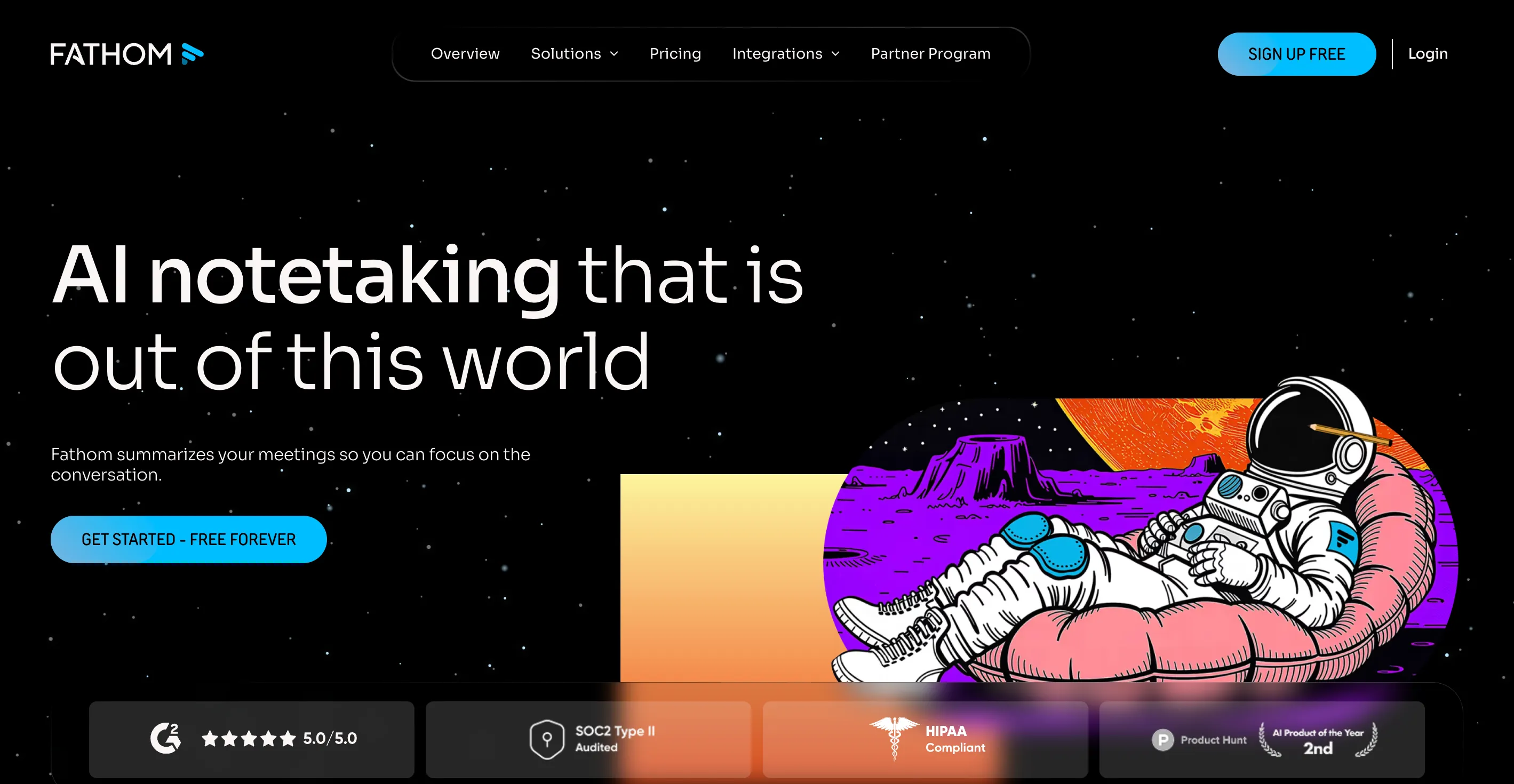
Fathom functions as a silent, smart note-taker that distills calls into essential highlights. During meetings, it captures timestamps, speaker segments, and decisions, then produces AI-generated recaps ready to share immediately. The tool frees reps from manual note-taking, promoting full focus on live conversations. Afterward, summaries are easily pushed into CRM records or team workspaces.
Fathom’s discreet presence preserves a natural, human flow during interactions, while maintaining complete accuracy in reporting. It is ideal for teams looking to reinforce customer engagement quality while ensuring every valuable detail is captured and shared.
Forecasting, Pipeline & Revenue Intelligence
15. Clari
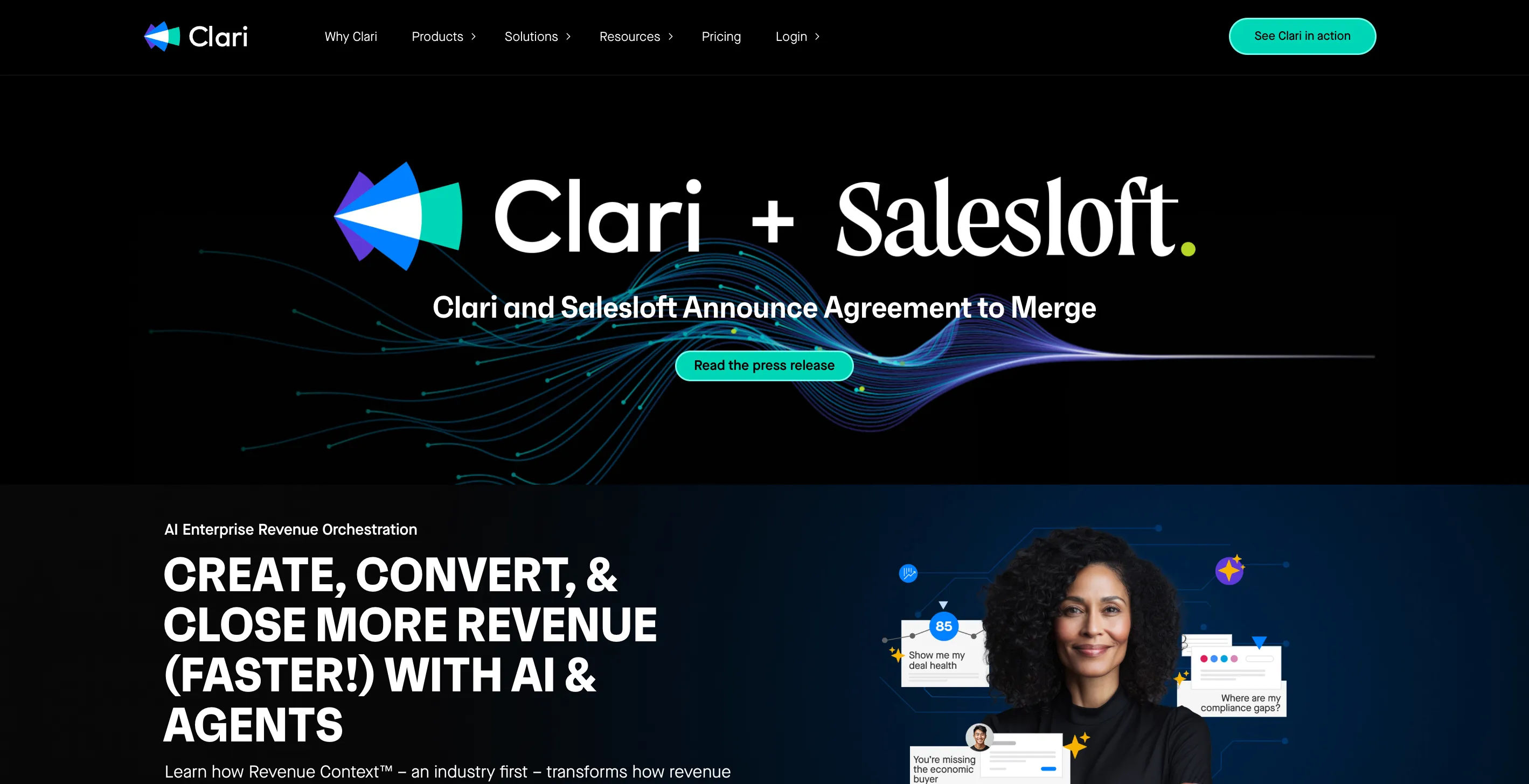
Clari delivers visibility into the entire sales pipeline using AI-powered forecasting and deal inspection. It aggregates CRM data, email patterns, and meeting activity to generate precise revenue predictions and flag at-risk opportunities. Managers can visualize performance through customizable dashboards and track how forecast accuracy evolves week over week. Clari’s insights extend to team-level productivity, helping leaders allocate resources effectively. Automating data consolidation and using predictive analytics eliminates the guesswork that typically clouds end-of-quarter planning.
For large organizations managing complex revenue motions, Clari’s single source of truth simplifies decision-making across both sales and finance operations.
16. Forwrd

Forwrd focuses on predictive lead scoring and revenue intelligence. It uses machine learning to assess which opportunities are most likely to close and when interventions might be needed. The platform automatically prioritizes leads in CRM systems based on activity signals, historical patterns, and buyer intent. Forwrd’s visual dashboards translate complex data into actionable recommendations that help sales managers steer teams strategically.
Beyond forecasting, it offers smart playbooks that evolve as the AI learns from outcomes, keeping enablement play strategies aligned with actual market conditions. The result is tighter targeting, faster sales cycles, and improved conversion accuracy.
17. Apollo.io
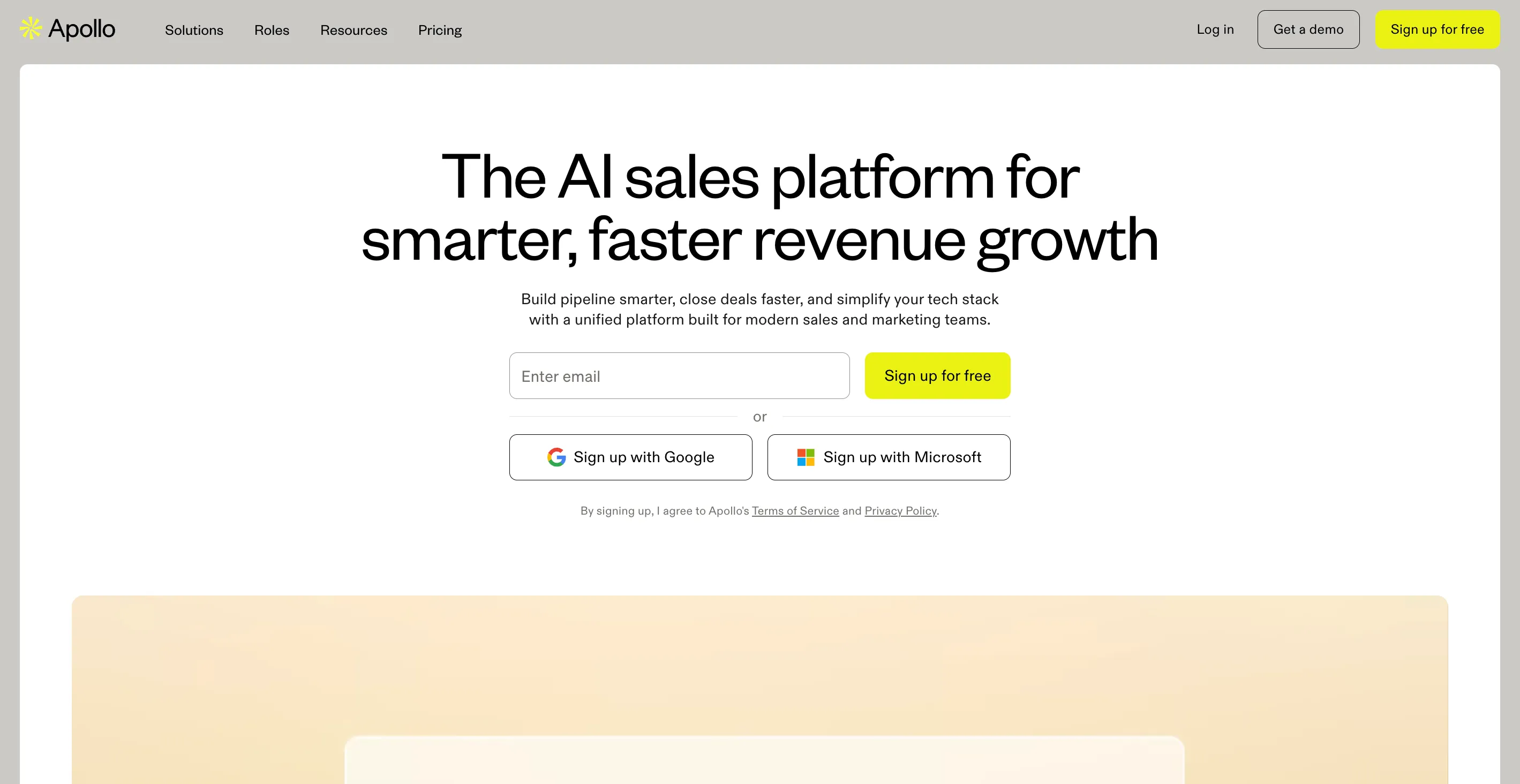
Apollo.io blends sales intelligence, engagement automation, and forecasting within one interface. Its AI engine enriches contact data from millions of verified sources, automates multichannel outreach, and scores leads based on engagement behavior. Sales teams can build automated sequences that adapt timing and language dynamically, merging outbound and revenue intelligence workflows.
Apollo.io also includes predictive reports to help managers visualize pipeline health and performance trends. Seamless CRM synchronization ensures clean records, efficient tracking, and better team collaboration. For fast-scaling sales organizations, Apollo.io combines prospecting, enrichment, and analytics into a single AI-powered growth platform.
Key Considerations When Choosing AI Sales Assistant Software
1. Use cases
Start by identifying the core problem you need to solve. Outbound prospecting tools like Alice help generate and nurture leads automatically, while inbound qualification platforms such as Julian focus on routing high-intent prospects in real time. Coaching tools, including Gong or Avoma, strengthen team performance through call review and feedback. Forecasting and revenue intelligence tools like Clari or Forwrd provide predictive insights for better decision-making. Mapping your most time-consuming sales activities to the right AI category will ensure the software directly impacts results instead of adding another tool to manage.
2. CRM integration
A strong AI assistant should fit seamlessly into your existing tech stack. Deep integrations with CRMs such as Salesforce and HubSpot ensure data flows automatically between systems and eliminate manual entry. AI sales assistants that sync activities, conversations, and follow-ups in real time prevent data silos and keep every stakeholder aligned. Look for two-way sync capabilities, automatic record enrichment, and accessible dashboards so your AI doesn’t just automate workflows but reinforces team accountability and deal visibility.
3. Pricing
Pricing varies by functionality, scale, and level of AI-powered capability. Free or entry plans are useful for experimentation, but serious deployment requires automation depth, analytics access, and advanced security. Compare not only the monthly cost but also productivity ROI: hours saved, prospects engaged, and revenue gained. The best pricing structure is the one that aligns with your sales motion and scales as adoption grows.
4. Onboarding
Ease of onboarding determines how quickly sales teams realize value. Look for AI platforms with intuitive dashboards, prebuilt templates, and step-by-step training workflows. Assistants that learn from your data and adapt automatically shorten the setup timeline significantly. Evaluate whether reps can use the platform with minimal supervision, and whether admins can create new playbooks without technical help. The faster your reps can use AI to run reliable sequences or follow-up tasks independently, the faster you’ll see measurable impact.
5. Metrics and dashboards
Data visibility is the foundation of sales enablement. Strong AI assistants surface metrics that matter—response rates, meeting conversions, follow-up timeliness, and pipeline health. Real-time dashboards empower managers to identify friction, coach effectively, and measure results across every stage of the sales process. Look for tools that provide trend reporting and predictive analytics powered by machine learning, not just activity counts. Your AI should transform raw interaction data into valuable insights that show exactly how automation is driving growth.
The Future of Sales Belongs to AI Assistants
AI sales assistants are changing how go-to-market teams operate. They eliminate repetitive work, keep CRM data accurate, and surface real-time insights that guide action. This shift allows human reps to spend more time on strategic conversations and closing deals, not manual upkeep.
11x delivers AI that fits directly into your existing workflows. Alice and Julian automate outreach, qualification with personalized messages, and follow-up inside Salesforce, HubSpot, and Slack to help teams convert opportunities faster and more consistently.
See exactly how they work in practice. Book a demo to explore how 11x can help your team drive top-of-pipeline leads automatically.
Frequently Asked Questions
AI sales assistants are AI-powered virtual agents that execute workflows autonomously, handling follow-ups, qualifying leads, and generating summaries, while traditional AI sales tools support but don’t act independently. Assistants use machine learning and natural language processing to deliver AI-generated insights and automate full sales activities. Tools work within templates and still need human input. AI Sales Assistants represent true enablement by closing the gap between automation and action.
Yes. Leading AI-powered assistants connect natively with major CRMs such as Salesforce and HubSpot for automatic syncing of data, notes, and follow-ups. This removes manual entry and ensures the sales pipeline stays accurate. These integrations also surface valuable insights right where reps work, improving enablement and execution speed across teams.
AI assistants don’t replace the human touch; they amplify it. By automating repetitive sales activities (research, updates, reminders) they free reps to focus on relationship building and closing deals. AI sales assistants like Julian use AI to qualify leads right when they sign up, improving conversion efficiency while keeping real conversations human. This is enablement, not replacement.
Alice from 11x leads outbound automation with AI-powered personalization, multi-channel outreach, and CRM integration. She crafts messages beyond simple templates, blending context-aware automation with a human touch. By using AI to identify and engage qualified leads, Alice delivers consistent, high-quality pipeline growth.


.avif)
.avif)
.avif)
.avif)